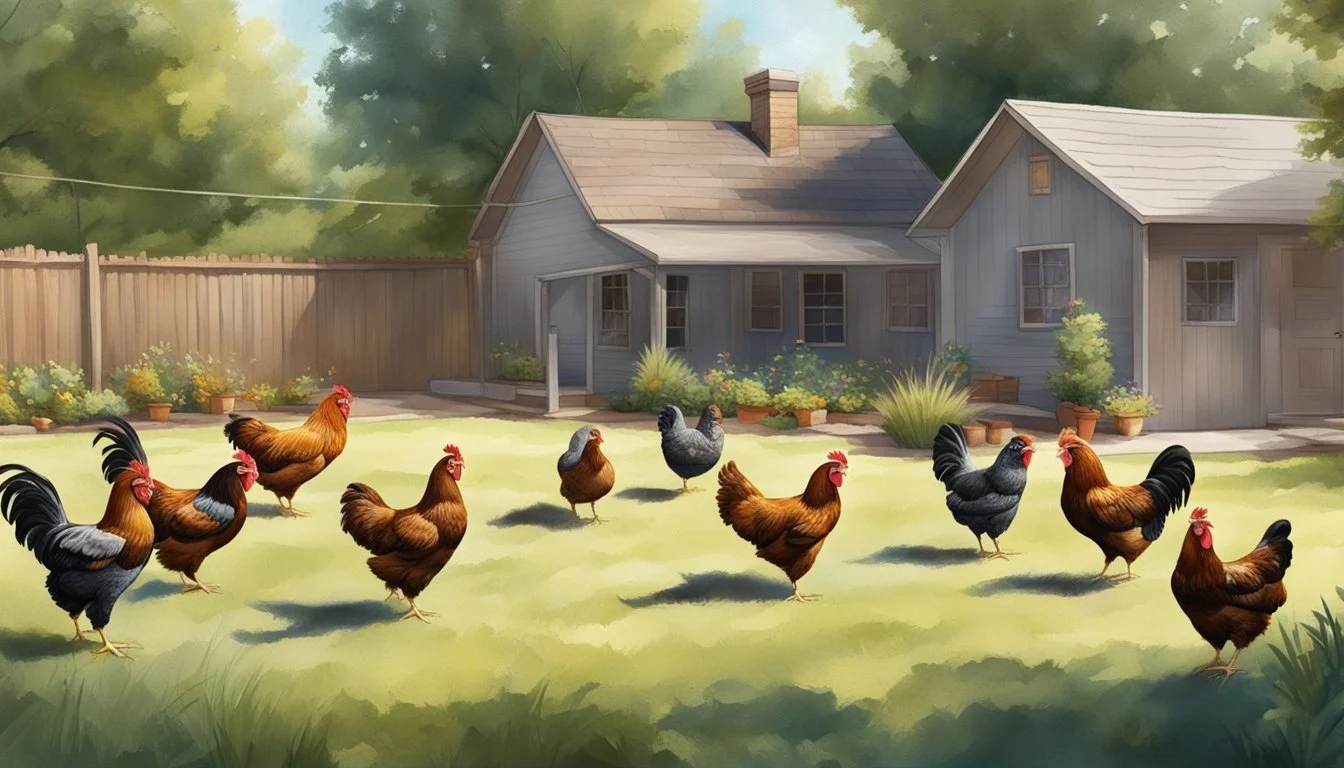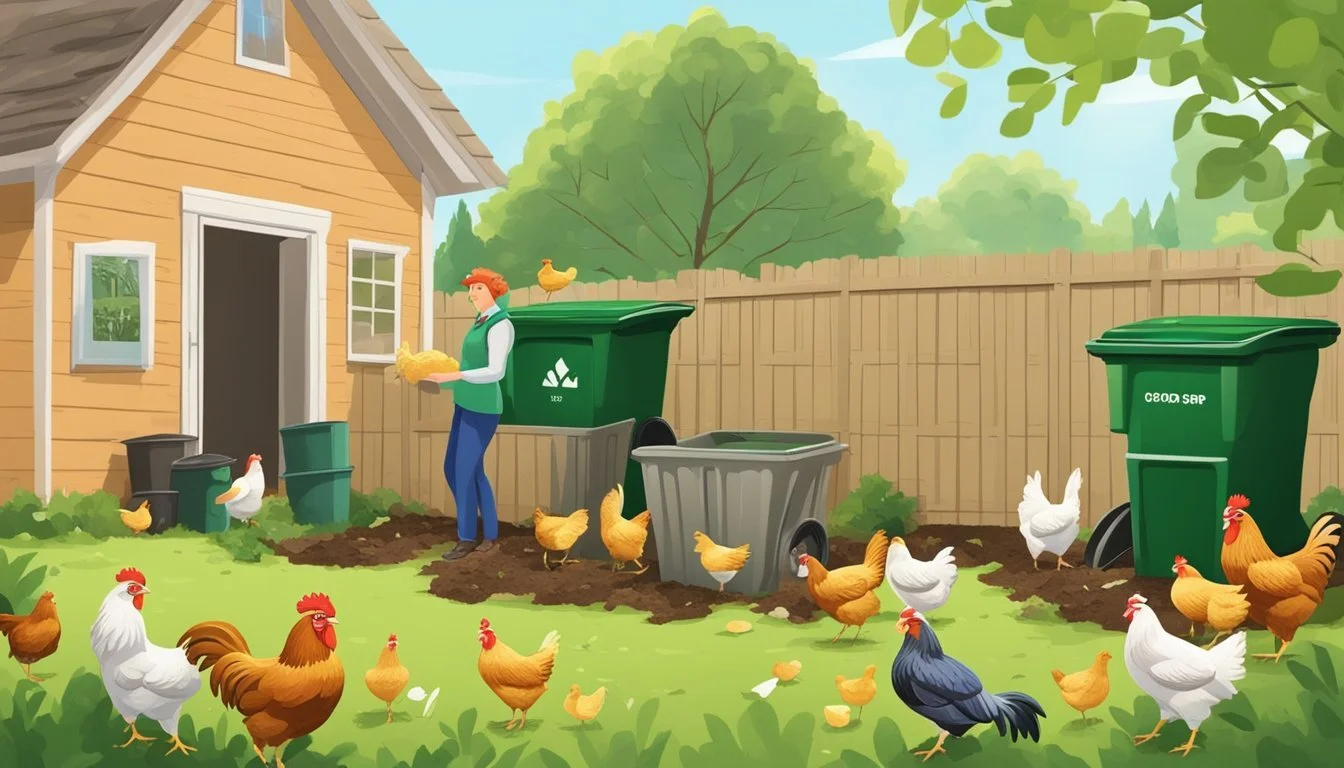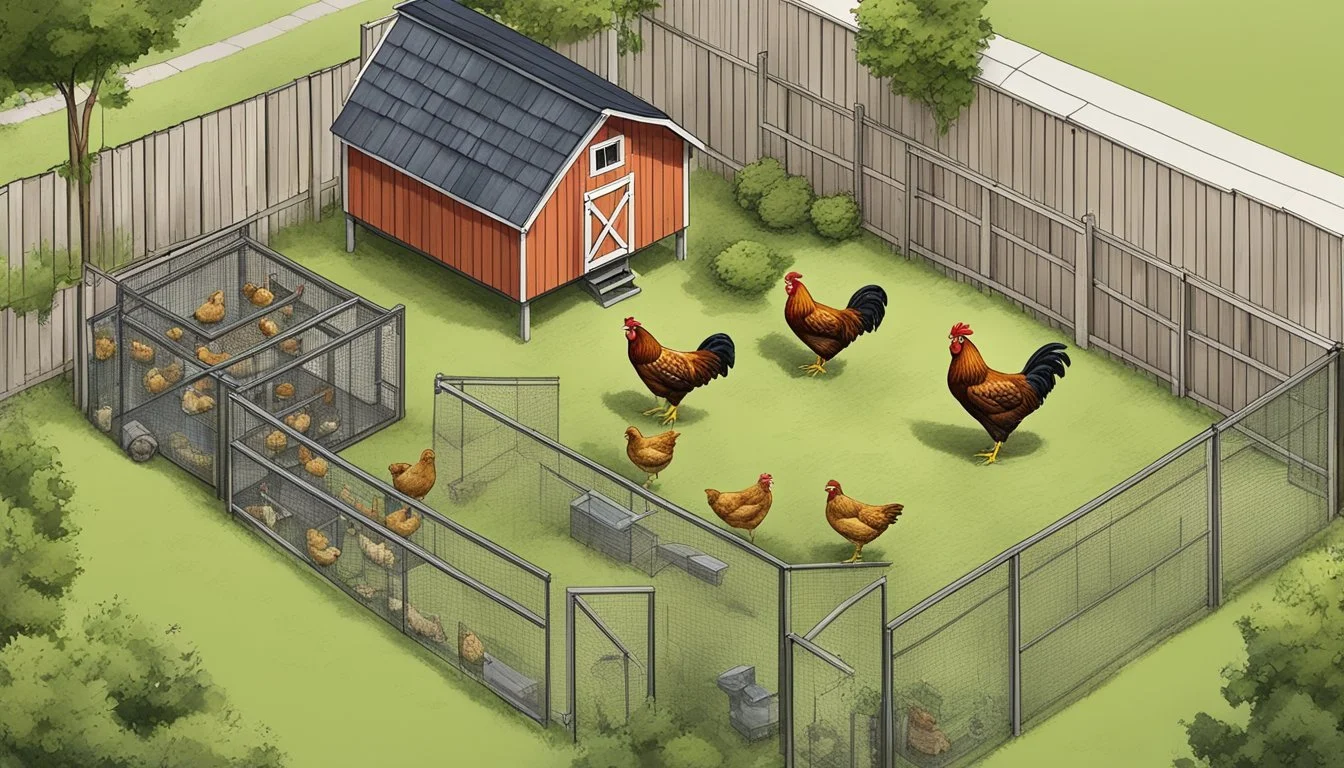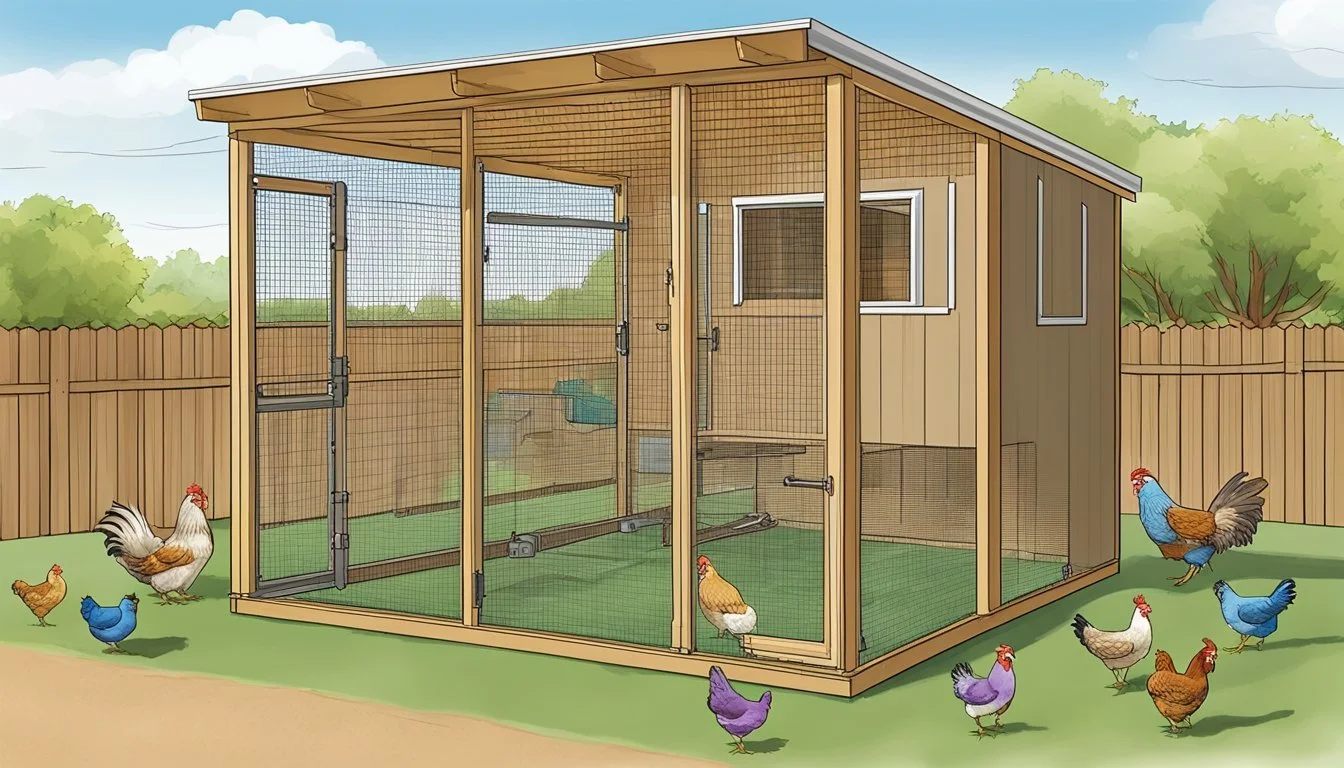Keeping Backyard Chickens in Denton, TX
Essential Tips for Urban Poultry Farmers
The city of Denton, Texas, offers its residents the opportunity to embrace sustainable living through the keeping of backyard chickens. As more individuals seek self-sufficiency and the joys of fresh eggs, understanding the local regulations is essential for would-be poultry keepers. Denton does not specify a maximum number of chickens a resident can own, but the city does enforce a ban on roosters due to noise considerations.
Residents must also adhere to coop restrictions; chicken structures cannot be within 150 feet of any other home or establishment, providing ample space to avoid potential issues with neighbors. Moreover, no permit is required to keep chickens, making it accessible for residents to start their own backyard flock.
While state law does not regulate the keeping of chickens, such as fowl, turkeys, geese, and ducks, it's the city ordinances that determine the lawful keeping of these animals. As such, potential poultry keepers in Denton are encouraged to familiarize themselves with the local ordinances to ensure they remain compliant while enjoying the benefits that come with raising their own chickens.
Understanding Local Ordinances
When considering raising backyard chickens in Denton, Texas, residents must adhere to specific local ordinances that regulate the activity. These rules include permit requirements, coop restrictions, and guidelines designed to maintain public health and safety.
City Regulations and Permits
In Denton, TX, residents are allowed to keep backyard chickens, but there are important city regulations to follow. Notably, no permit is required to keep chickens. However, there are critical coop restrictions: residents cannot keep chickens in a structure if it is within 150 feet of any residence or business establishment. This distance is measured from the coop to the nearest neighbor's dwelling or any commercial structure.
Fines for Non-Compliance
Compliance with these ordinances is mandatory, and failure to adhere can result in penalties. While specific fine amounts can vary depending on the extent of the violation, the City of Denton enforces the ordinances strictly to ensure compliance. Residents found in violation of coop distance requirements or other pertinent regulations may face monetary fines as a consequence. It is imperative for residents to follow these regulations meticulously to avoid such penalties.
Choosing the Right Chicken Breeds
When selecting the right chicken breeds for a backyard flock in Denton, TX, one must consider both breed characteristics and climate adaptability. These factors are essential to ensure the chickens thrive and the upkeep remains manageable for the owner.
Breed Characteristics
Size: Breed size varies significantly, with larger breeds such as Jersey Giants weighing up to 15 pounds, while bantams are considerably smaller. Egg Production: Some chickens, like the prolific Buff Orpington, are known for their ample egg-laying capabilities. Temperament: Buff Orpingtons are also noted for their docile nature, a trait desirable for backyard flocks due to their ease of handling.
Jersey Giants: Known for their large size yet gentle temperament.
Buff Orpingtons: Celebrated for being calm, friendly, and good egg layers.
Climate Considerations
Denton, TX experiences a variety of weather conditions, and chicken breeds must be able to adapt to its hot summers and mild winters.
Heat Tolerance:
Buff Orpingtons are well-suited for the Texas climate, with their ability to handle heat while being affectionate pets.
Coop Requirements:
Denton regulations mandate that coops cannot be closer than 150 feet to any home or establishment, thus, space and placement within the property should be planned accordingly.
Designing Your Coop and Yard
When keeping backyard chickens in Denton, TX, it's crucial to ensure they have a safe and adequate structure. Not only should the coop and surrounding yard provide shelter and comfort, but they also have to comply with local guidelines to avoid any legal issues.
Coop Requirements
Location: Under Denton regulations, a coop cannot be situated within 150 feet of any residence or business other than the chicken owner's property. This is to minimize disturbances to neighbors and ensure a hygienic distance between chickens and human habitats.
Dimensions and Amenities:
Nesting Boxes: One nesting box for every three to four hens is recommended. Boxes should be about 12x12x12 inches to accommodate the size of the birds.
Roosts: Ample roosting space should be provided for the chicken to sleep and rest, ideally 8-10 inches per bird.
Ventilation and Insulation: Proper airflow is paramount to prevent moisture buildup and to keep the chickens healthy while also insulating the structure against Texas's varying temperatures.
Maintenance: The chicken coop must be cleaned regularly to maintain the birds' health and prevent odors and pests.
Pen and Yard Safety
Fenced Yard: A secure fenced yard or pen is necessary to protect chickens from predatory animals common in Texas, such as foxes, raccoons, and birds of prey.
Enclosures:
Materials: Durable wiring or fencing materials are crucial for enclosing and topping the pen area to prevent predators from entering.
Space: At least 10 square feet per chicken in the yard allows for adequate exercise and foraging space.
Protection: Regular checks of the structure for wear or damage will help ensure continued safety for the chickens.
Feeding and Caring for Chickens
Raising backyard chickens in Denton, TX involves understanding the essentials of proper nutrition and maintaining the health and welfare of the birds. These two core areas will ensure the chickens thrive in their environment.
Nutrition Basics
Chickens require a balanced diet to maintain their health and egg production. Commercially available feed typically provides a mix of grains, proteins, vitamins, and minerals suited to their dietary needs. Pullets—young hens—especially need high-protein feed to support their growth and development.
Starter Feed: A high-protein feed for the first weeks of life.
Grower Feed: Less protein when they begin to mature, but not yet laying eggs.
Layer Feed: Introduced when chickens start laying eggs, to provide extra calcium for shell formation.
An owner can supplement their diet with kitchen scraps and garden produce but should avoid giving anything high in fat or salt and any toxic foods like onions, chocolate, or avocado.
Health and Welfare
The health and welfare of backyard chickens encompass preventative measures and proactive care. Firstly, clean, predator-proof housing is crucial to protect chickens from diseases and potential threats. It should be noted that Denton City ordinance prohibits keeping chickens in structures within 150 feet from any other home or establishment.
Cleanliness: A clean coop prevents the spread of disease and pests.
Vaccinations: Chickens should be vaccinated against common diseases.
Parasite Control: Regular checks for mites, lice, and internal worms are necessary.
Regular observation helps in spotting any signs of distress, disease, or injury in chickens early on. Access to a veterinarian familiar with poultry is essential for maintaining their welfare, as chickens can hide symptoms of illness until it becomes serious.
By providing a balanced diet and a safe, clean environment, one can ensure the welfare of their backyard chickens and enjoy the process of raising them in Denton, Texas.
Breeding and Raising Chickens
In Denton, TX, breeding and raising chickens allows poultry enthusiasts to sustain their flocks and cultivate particular traits. This endeavor requires an understanding of the processes of incubation, hatching, and the proper care of growing chicks.
Incubation and Hatching
For successful incubation and hatching, a controlled environment is crucial. Temperature should be consistently maintained at 99.5°F with a humidity level of around 50-55%, which increases to 65% in the last few days before hatching. It is essential to regularly turn the eggs to ensure proper development, which can be done manually or with an automatic egg turner.
In Denton, those interested in breeding hens should note that regulations do not permit roosters, which are necessary for fertilizing eggs. Therefore, fertilized eggs must be sourced elsewhere if one intends to hatch their own chicks rather than purchasing pullets (young hens).
Rearing Chicks
Once the chicks hatch, the focus shifts to rearing them into healthy pullets or laying hens. For the first few weeks, chicks should be kept in a brooder, an enclosed space with a heating source to keep the temperature between 95°F dropping 5°F each week until it reaches room temperature. Fresh water and starter feed should be available at all times.
As the chicks grow, their environment can progressively transition to free range conditions, where they have more space to roam and forage, promoting healthier birds and potentially better quality eggs. Denton residents looking to raise free-range chickens must ensure their coop is at least 150 feet from any other home or establishment, offering ample room for chickens to thrive.
Managing Waste
Effective waste management in backyard chicken keeping is crucial for maintaining a clean coop environment and ensuring public health. Proper disposal techniques and odor prevention strategies can greatly reduce the risks of attracting pests like flies, rodents, and other unwanted insects or animals.
Composting and Disposal
Composting chicken waste is an environmentally friendly way to recycle nutrients back into one's garden. Chicken manure needs to be properly composted before it can be used as fertilizer to safeguard against potential pathogens.
Collect manure and bedding materials.
Allow the pile to reach a high enough temperature to kill pathogens.
Regularly turn the pile to oxygenate and speed up the composting process.
After sufficient decomposition, apply the compost to garden beds.
Disposal methods should be consistent with local Denton regulations to maintain sanitation and public health standards. Manure that is not composted needs to be securely bagged and placed in designated waste bins for collection.
Preventing Odors and Pests
Minimizing odors and pests is a key aspect of backyard chicken keeping as they can become not only a nuisance but also a health hazard.
Odor Control:
Regularly clean the coop to remove waste.
Use absorbent materials like straw or wood shavings for bedding.
Ensure proper ventilation within the coop.
Insects and animals are attracted to chicken coops primarily because of the availability of food and waste. To deter these pests:
Pest Prevention:
Keep the coop and surrounding area clean and free of waste.
Securely store feed in containers with tight-fitting lids.
Set up barriers or traps for rodents if necessary.
By adhering to these practices, chicken keepers can manage waste effectively, preserving the well-being of their chickens and the surrounding community.
Community Considerations and Etiquette
Keeping backyard chickens in Denton, TX requires familiarity with city ordinances to ensure that the activity remains respectful and considerate of the community. Proper maintenance and awareness can prevent disruptions within residential neighborhoods.
Avoiding Nuisances
Residents must ensure that their chicken coops are more than 150 feet from any other home, school, hospital, or other establishments to prevent any potential public nuisance. Additionally, coops, pens, and enclosures should be kept in a condition that avoids offensive odors or the attraction of insects or animals that could risk public health or safety.
Odor control: Clean regularly to avoid offensive smells.
Insect/animal attraction: Secure feed and nesting areas.
Roosters, which are known for their loud crowing, may not be suitable in a city setting and can cause disruptions. Similarly, larger fowl such as ducks and geese may not be appropriate in dense residential areas.
Educating Neighbors
It's beneficial for residents to engage with their neighbors regarding the keeping of backyard chickens. Education about the benefits and responsibilities can foster a supportive community environment.
Discuss benefits: Share information about fresh eggs and natural pest control.
Explain maintenance: Inform neighbors about how you plan to keep the area clean and animals healthy.
By considering community impacts and engaging in open communication with neighbors, families can enjoy the benefits of keeping fowl while adhering to Denton's ordinances and respecting those living nearby.
Legal Responsibilities
In Denton, Texas, the legal responsibilities of keeping backyard chickens are dictated by specific city ordinances that address not only where and how chickens can be housed but also the broader aspects of liability, insurance, and animal welfare laws.
Liability and Insurance
Individuals keeping chickens in Denton are liable for any damages or nuisances their chickens may cause. The city's ordinances mandate that coops and other enclosures must not be within 150 feet of any other home or establishment to prevent issues. Owners should consider liability insurance to cover any potential property damage or injuries their chickens might cause to others.
Animal Welfare Laws
The welfare of chickens in Denton is protected under animal welfare laws. Enclosures for chickens must be maintained to prevent offensive odors and to not attract pests that threaten public health, safety, or welfare. Additionally, Denton's laws prohibit tethering that does not allow chickens adequate movement, or that leaves them unattended in an unsafe manner. Compliance with Section 6-26 of the City Ordinance is necessary for all poultry owners in the city.








